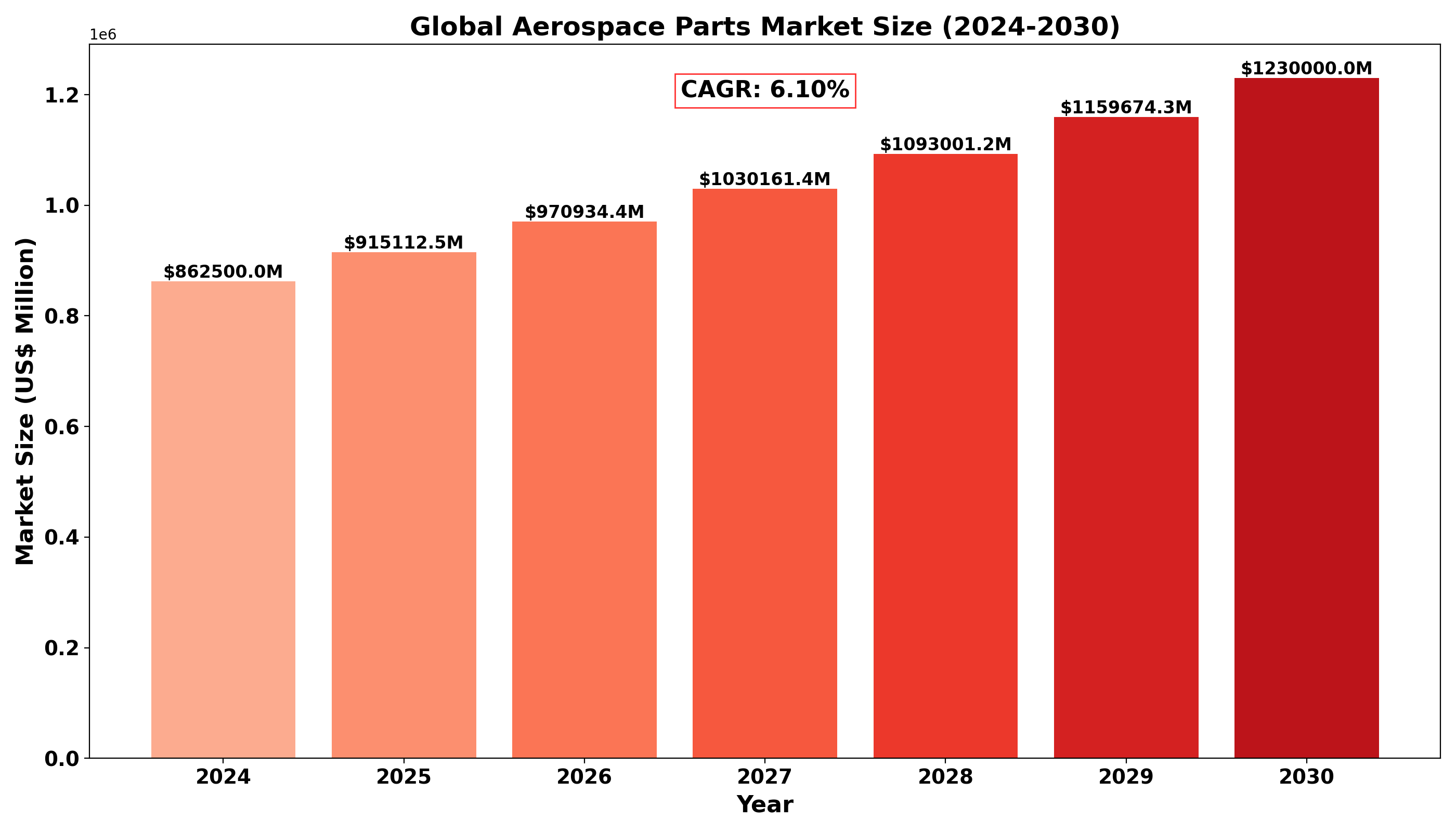The global Aerospace Parts market size was valued at US$ 862.5 billion in 2024 and is projected to reach US$ 1230000.0 million by 2030, at a CAGR of 6.10% during the forecast period 2024-2030.
The United States Aerospace Parts market size was valued at US$ 285.3 billion in 2024 and is projected to reach US$ 392.7 billion by 2030, at a CAGR of 5.5% during the forecast period 2024-2030.

Aerospace Parts encompass a wide range of components, systems, and materials used in the construction, maintenance, and operation of aircraft, spacecraft, and related equipment, including engines, avionics, structural elements, and interior components.
The global Aerospace Parts market is experiencing robust growth, driven by increasing air travel demand, fleet modernization efforts, the rise of new entrants in the space industry, and technological advancements in aircraft design. In 2023, the commercial aviation sector accounted for 65% of the market value, followed by military aerospace at 25% and space systems at 10%. The market saw a significant recovery post-pandemic, with a 15% increase in parts demand for new aircraft production in 2023 compared to 2022. Engine components remain the largest segment, representing 30% of market value, followed by structural parts at 25% and avionics at 20%. Technological advancements have focused on lightweight materials and additive manufacturing, with new composite and 3D-printed parts offering up to 40% weight reduction compared to traditional metallic components. The market is witnessing strong growth in electric and hybrid-electric propulsion components, increasing at 22% annually, driven by the push for sustainable aviation. In 2023, the trend towards more electric aircraft led to a 30% increase in the adoption of advanced power electronics and electrical systems. The industry faces challenges from supply chain disruptions and raw material shortages, but vertical integration strategies and the development of alternative suppliers are addressing these issues. Emerging applications in urban air mobility and supersonic travel are showing significant promise, with specialized parts for these new aircraft categories growing at 25% CAGR, albeit from a small base of 2% market share. The space sector, particularly the small satellite market, is experiencing rapid growth, with parts for cubesats and small launchers increasing at 18% annually. Looking ahead, the market is expected to benefit from innovations in smart, connected aircraft parts, with components featuring integrated sensors and predictive maintenance capabilities projected to grow at 15% CAGR through 2030. The development of hydrogen propulsion systems and hypersonic technologies is also driving new demands in specialized aerospace parts, shaping the future of the industry.
Report Overview
Aerospace Parts Market provides a deep insight into the global Aerospace Parts market covering all its essential aspects. This ranges from a macro overview of the market to micro details of the market size, competitive landscape, development trend, niche market, key market drivers and challenges, SWOT analysis, value chain analysis, etc.
The analysis helps the reader to shape the competition within the industries and strategies for the competitive environment to enhance the potential profit. Furthermore, it provides a simple framework for evaluating and accessing the position of the business organization. The report structure also focuses on the competitive landscape of the Global Aerospace Parts Market, Aerospace Parts Market introduces in detail the market share, market performance, product situation, operation situation, etc. of the main players, which helps the readers in the industry to identify the main competitors and deeply understand the competition pattern of the market.
In a word, Aerospace Parts Market is a must-read for industry players, investors, researchers, consultants, business strategists, and all those who have any kind of stake or are planning to foray into the Aerospace Parts market in any manner.
Global Aerospace Parts Market: Market Segmentation Analysis
The research report includes specific segments by region (country), manufacturers, Type, and Application. Market segmentation creates subsets of a market based on product type, end-user or application, Geographic, and other factors. By understanding the market segments, the decision-maker can leverage this targeting in the product, sales, and marketing strategies. Market segments can power your product development cycles by informing how you create product offerings for different segments.
Key Company
Market Segmentation (by Type)
Market Segmentation (by Application)
Geographic Segmentation
Key Benefits of This Market Research:
Key Reasons to Buy this Report:
Frequently Asked Questions ?
